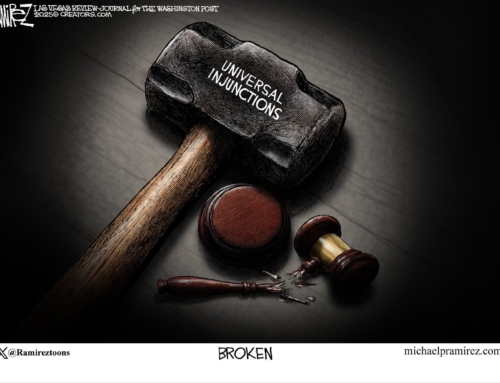
Speaker of the House Mike Johnson is considering recess appointments to ensure swift confirmation of President Trump’s Cabinet nominees if the Senate fails to do its job.
President Trump has been vocal about his frustrations with the Senate’s pace in confirming key nominees.
In a Truth Social post, he previously emphasized the necessity of recess appointments to bypass delays:
Trump wrote:
“Any Republican Senator seeking the coveted LEADERSHIP position in the United States Senate must agree to Recess Appointments (in the Senate!), without which we will not be able to get people confirmed in a timely manner. Sometimes the votes can take two years, or more. This is what they did four years ago, and we cannot let it happen again. We need positions filled IMMEDIATELY!
Elon Musk echoed Trump’s urgency, tweeting:
“Without recess appointments, it will take two years or more to confirm the new administration! This would make it impossible to enact the change demanded by the American people, which is utterly unacceptable.”
The U.S. Constitution allows the President to make temporary appointments during Senate recesses to fill positions that require Senate approval.
For a recess appointment to be possible, Congress must be in recess for at least 10 days, a requirement made clear by the Supreme Court in 2014.
The House can influence the recess appointment process. The House Speaker may propose a concurrent resolution for both chambers to adjourn, effectively facilitating the conditions needed for a recess appointment.
Alternatively, if the House and the Senate are unable to agree on adjournment, the President might use this disagreement to adjourn both, enabling the use of recess appointments, according to CNN.
House Speaker Mike Johnson (R-LA) joined Fox News Sunday with Shannon Bream to discuss the challenges facing President Trump’s cabinet nominations, including the selection of former congressman Matt Gaetz for Attorney General.
Shannon Bream:
The House Ethics Committee has been investigating one of President Trump’s nominees, former Congressman Matt Gaetz, now up for attorney general. They say their Friday meeting was postponed, not canceled, but it doesn’t look like the report they may have been working on will be released.Our intrepid Congressional Correspondent, Chad Pergram, points out there have been at least two instances where a report was released after a member left Congress. Why oppose transparency? This report may even clear him—especially for someone who could become the top federal law enforcement officer in this country.
Mike Johnson:
I don’t know anything about the contents of the report because, under the rules, the Speaker of the House cannot influence or be involved in Ethics Committee proceedings. However, claims about precedent for releasing reports aren’t entirely accurate. While there have been two breaches of tradition under extraordinary circumstances, this case doesn’t meet those criteria.Matt Gaetz is a colleague of mine—we’ve served together for over eight years. He’s one of the brightest minds in Washington and deeply understands how the Department of Justice has been weaponized. He’ll be a reformer, which is why the establishment in Washington seems unsettled by this pick.
Regarding the report, the tradition of not issuing ethics investigations on former members exists for a reason. The jurisdiction of the Ethics Committee is limited to current members of Congress. To change that protocol could open a Pandora’s box and lead to potential misuse of the committee’s authority in the future.
The Ethics Committee’s jurisdiction is limited to current members, and breaking this protocol could set a dangerous precedent.
Despite calls from both sides of the aisle to release the Ethics Committee’s findings, Johnson stood firm, arguing that the committee’s jurisdiction is limited to current members of Congress.
Shannon Bream:
His nomination will obviously have to go through the Senate Judiciary Committee. That’s going to be a long process. Our next guest, Senator Chris Coons, is part of that committee and says the report should be released. He’s not alone in that view… Republican Senator John Cornyn… even open to issuing a subpoena to the House Ethics Committee. How do you see this playing out?Mike Johnson:
I hope the Ethics Committee sticks to tradition and protocol for the reasons I mentioned. Expanding their jurisdiction to former members would be dangerous and unprecedented. People could weaponize that process.As for Matt Gaetz, he’s the right pick to reform the Department of Justice. We served on the Judiciary Committee together for nearly seven years, and we’ve seen firsthand how the DOJ has been politicized—targeting Catholics, school board parents, and pro-life Americans. Gaetz will bring the reforms the American people expect.
As Senate gridlock threatens to stall critical confirmations, Johnson suggested the potential use of recess appointments and emphasized that all options will be considered if the Senate fails to take action.
Shannon Bream:
President Trump has made it clear that if his nominees are blocked, he’s open to pursuing recess appointments. Forbes noted that lawmakers in both the House and Senate must agree for the Senate to adjourn for more than 10 days. What’s your role in this process? Would you facilitate recess appointments?
Mike Johnson:
I believe a new president should be able to choose their team. It shouldn’t be a controversial notion. Unfortunately, we’re in a deeply divided government, and the Senate may stall this process. If that happens, it would hurt the country.The American people have given President Trump a clear mandate—an overwhelming popular vote and Electoral College victory. His nominees are part of delivering on that America First agenda. If necessary, we’ll evaluate the recess appointment option at the appropriate time.
Shannon Bream:
Critics argue that recess appointments undermine the Senate’s constitutional role. The Wall Street Journal editorial board called it anti-constitutional, saying it could open the door for future presidents to bypass Senate confirmations entirely. Wouldn’t this set a dangerous precedent?Mike Johnson:
As a constitutional lawyer, I’ve always been a staunch defender of the Constitution. I’m sympathetic to these concerns. However, I’m hopeful the Senate will fulfill its constitutional duty and confirm these nominees. The hyperbole surrounding this issue is a distraction meant to stall President Trump’s agenda.
WATCH:
Subscribe Below To Our Weekly Newsletter of our Latest Videos and Receive a Discount Code For A FREE eBook from our eBook store:





